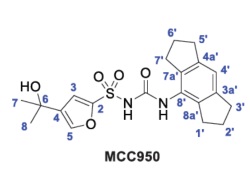A small-molecule inhibitor of the NLRP3 inflammasome for the treatment of inflammatory diseases
Nat Med. 2015 Feb 16. doi: 10.1038/nm.3806. [Epub ahead of print]
Professor O'Neill and his team have identified MCC950 as a potent, selective, small-molecule inhibitor of the NLRP3 inflammasome (a key component of the inflammatory process). MCC950 inhibition of NLRP3 in vivo has been shown to attenuate the severity of a model of multiple sclerosis. In addition, ex vivo activity has been seen in Muckle–Wells syndrome.
The findings suggest they have found a potentially transformative medicine, which targets what appears to be the common disease-causing process in a myriad of inflammatory diseases. This discovery potentially represents a major development in the search for new treatments for inflammatory diseases. Further research is ongoing to define the precise mechanism of action.

